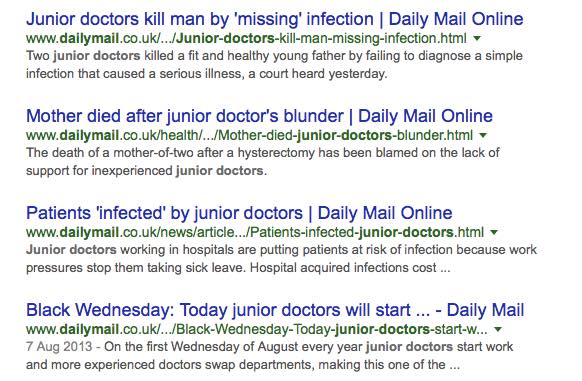“Doctors will have to demonstrate that they have “emotional resilience” before they are allowed to practice”, so writes Laura Donnelly in the Telegraph. The Comments, sparked by an exchange with Professor Terence Stephenson, chairman of the General Medical Council (GMC), seek to highlight the psychological demands placed on junior doctors today.
Emotional resilience is an important skill. There are lots of ways that undergraduate education can help students explore and anticipate difficulties they will encounter in their training. This aspect of training should of course be taken seriously by medical curricula but lets not pretend that resilience is an all or nothing attribute. It is fundamentally fluid. It is not like passing your anatomy exam and suggesting that it will be systematically tested at undergraduate level is frankly absurd. Will there be a resilience OSCE?!! – the mind boggles. Preparation for emotional difficulty is of course an important part of a rounded education but any reasonable approach would add more weight to helping junior doctors feel like there will be a system there to catch them when they fall.
I have a couple of issues though with arguments that tend to band around the word resilience like it is going to solve the problems doctors face in todays society. First of all, medicine has always been difficult. There has always been sadness and trauma. There have always been uncomfortable sights, uncomfortable exchanges and uncomfortable dreams at night. So what has changed? Why is there a sudden concern that doctors have become psychologically inept? After all, burnout is a very real concern. Things we encounter in medicine however are no more sad then they were one-hundred years ago. I would argue that what has changed is everything else.
As I have said before, I strongly believe that the training of junior doctors today breads insecurity. We are constantly forced to move around the country. Each time we are forced to gather proof of our professional attributes from a growing multi-disciplinary team; ward-clerks to health care attendants to physician assistants and consultants; a constant treadmill of snapshot assessments. Sometimes it feels like you may as well be standing in the middle of the room screaming ‘validate me, validate me!’. At the end of each year we have an annual review of competency and progression (ARCP). This process again has been reduced to a kafka-esque farce of box ticking and pseudo-assessment. A colleague of mine has genuinely been held back in training because a supervisor neglected to fill out an end of block report and then retired.
Next we could talk about the actual shape of training pathways in the UK. Young doctors are being forced to make life changing decisions about where their talents lie earlier and earlier in their career. There is no provision for allowing time within the system to time to explore your personal attributes and decide what career path you are best suited to. The treadmill keeps going and will not wait…as the queen of hearts said to Alice ‘My dear, here we must run as fast as we can, just to stay in place. And if you wish to go anywhere you must run twice as fast as that’. Lets not forget that should the DDRB have their way, the ability to change career paths will become such a difficult decision that even more weight will be added to those very early career choices.
Lets talk about down time. Many junior doctors still actually face fixed annual leave. The short rotations and on-call commitments mean organising significant amounts of leave is a administrative nightmare. Junior doctors find themselves begging medical staffing department for rotas just so they can find out if they can attend their best friends wedding, in fact I also know someone who had a great deal of difficulty trying to find out if they needed to worry about being be on call for their own wedding! My current placement means I can’t take any leave for the first three months. I then have 13 days to use up in the remaining 3 months, but I can’t organise these yet because I don’t have my on-call rota for that time. Oh and yes I’ve been warned that if I fail to take my leave, I will not be paid in lieu.
What about job placements? Once you’ve secured your national training number you’re forced to wait it out to find out which part of an often very large deanery you are allocated to. Will you have to move house? Will your children be able to attend their school? Will you be able to live with your partner this year? In a system that claims not to be able to take the vast majority of personal preferences into account, we have young registrars passing four district hospitals just to get to the one they’ve been sent to with absolutely no evidence that there was a logical reason for that choice, either in terms of service provision or training needs. I am one month into a five year training program with a new mortgage and I cannot plan my life past the next three months.
What of the media? Type junior doctor and any tabloid into a search engine and see what news you find. Here’s an example of the first four hits from the Daily Mail:
Now lets add into this picture the fact that the government with their ‘accept or prepare to be forced mentality’ has recently put us all in mortal fear of their grossly unfair contract proposals.
There are a great many of things responsible for burn-out in junior doctors today, but lets stop banding around the term ‘resilience training’ like it’s the answer. It isn’t. If the powers that be really want to improve the quality of life for thousands of juniors doctors in the country they would do well to focus on everything else.

Stupendous! Absolutely eloquently put!